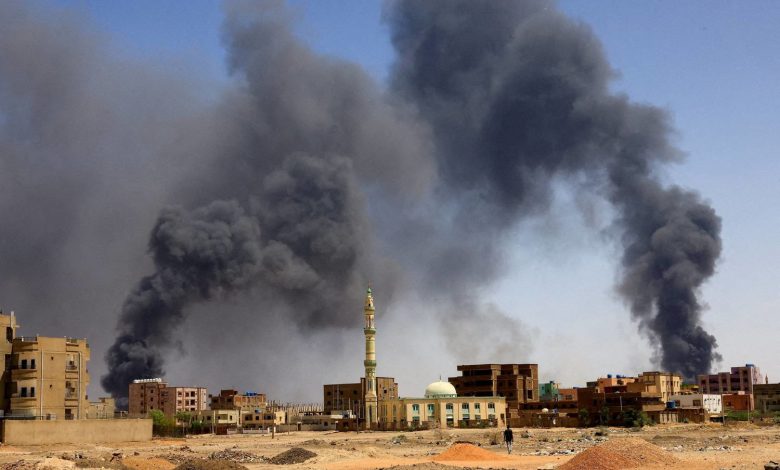Sudanese Divide Over Deploying UN Force to Protect Civilians

By: Al-Noor Ahmed Al-Noor
A recommendation by the United Nations Human Rights Council’s fact-finding mission in Sudan to deploy an international force to protect civilians has sparked division. While the government dismissed it as “a storm in a teacup,” the Rapid Support Forces (RSF) claimed it would lead to two governments, and experts highlighted complexities in the UN Security Council and practical challenges that could hinder the move.
In its first report since its establishment in October, the mission stated last Friday that both parties in the conflict have committed “horrific human rights violations that may amount to war crimes,” urging Sudanese authorities to cooperate with the International Criminal Court. It added that “the RSF launched ethnically motivated attacks in Darfur, while both sides engaged in arbitrary arrests, torture, sexual violence, and indiscriminate attacks, including airstrikes and shelling against civilians, schools, hospitals, communication networks, and water and electricity supplies.”
Storm in a Teacup
The mission called on the Sudanese army and RSF to immediately cease attacks on civilians without conditions and recommended deploying an independent and neutral force to protect civilians. The report also emphasized expanding the current arms embargo on Darfur, based on the 2004 Security Council resolution, to cover all regions of Sudan to prevent the supply of arms, ammunition, and logistical or financial support to the warring factions and halt the escalation.
Sudan’s Foreign Minister, Hussein Awad, described the UN mission’s report as “a storm in a teacup” with political motives. He told Al Jazeera Mubasher that the report is “part of what Western countries are doing to politically cover those supplying weapons to the RSF rebels.” In his view, the mission’s call to extend the arms embargo on Darfur to the entire country is merely “an excuse for the interests of Western countries,” aimed at “polishing the image of those supporting the rebellion.”
He added that the draft resolution submitted to the UN Security Council regarding humanitarian aid access and civilian protection is “a mere pretext for Western agendas,” calling for the condemnation of the RSF for “obstructing humanitarian aid, which was brought through government-established channels.”
Challenges
In contrast, the advisor to the RSF commander, Al-Basha Tabiq, said the fact-finding mission’s recommendation to deploy a neutral force to protect civilians “is a natural response to the army’s intransigence and its refusal to negotiate, as well as its continuous escalation and targeting of civilians.”
In a post on X (formerly Twitter), Tabiq noted that “the current situation requires international intervention to ensure the safety of citizens,” and affirmed that “the deployment of a neutral force could bring a fundamental shift in Sudan’s political scene, potentially leading to the existence of two governments in the country.”
Meanwhile, legal expert and former Undersecretary of the Ministry of Justice, Ahmed Al-Mufti, argued that arms embargoes and deploying forces to protect civilians are beyond the fact-finding mission’s mandate. According to him, the mission’s demands are “merely non-binding recommendations, as such decisions fall under the authority of the Security Council under Chapter VII.” He noted that whether the recommendation is implemented depends on Russia and China, both of which have interests in Sudan and oppose interference in domestic affairs, resisting the unipolar world order the United States seeks to impose.
In an interview with Al Jazeera Net, Al-Mufti recalled that in 2007, the UN deployed around 30,000 military personnel to Darfur under Chapter VII, which permits the use of force. However, “no one felt their presence due to their weakness; they even required protection from the Sudanese army against rebel movements, despite their mandate to protect civilians.”
He predicted the failure of any force deployed to Sudan, given the complex military situation involving hundreds of thousands of troops and fighting across vast regions, not limited to Darfur as before. In his view, deploying such forces under current conditions is almost impossible.
Intervention and Division
Political researcher Faisal Abdel Karim noted that an international force can only be deployed either at the government’s request or by a Security Council resolution when the situation is deemed out of control, or when the state is unable to protect civilians or poses a threat to international peace and security, “as Sudan is currently classified.”
Speaking to Al Jazeera Net, Abdel Karim anticipated that China and Russia might not oppose such a decision, citing historical precedents where they abstained from vetoing resolutions on Sudan, such as the recent ceasefire decision regarding El Fasher.
According to him, challenges remain if the Security Council passes a resolution to deploy a force to protect civilians, including its mission, whether it will maintain peace or enforce it, and whether both the Sudanese government and RSF will consent or reject it, along with the financial, ethical, and logistical costs of deploying such a force and determining its size and composition.
Agreements Between Sudan and Beijing for Gold and Copper Mining
Meanwhile, journalist and editor-in-chief of “Al-Tayar” newspaper, Othman Mirghani, considered the UN mission’s recommendation to deploy a force to protect civilians as the beginning of direct military intervention in the country. In a Facebook post, he added, “It is also the beginning of Sudan’s division, as it will solidify the RSF’s occupation of areas they have seized,” indicating that it “will not protect civilians but rather perpetuate the war.”
*Source: Al Jazeera



